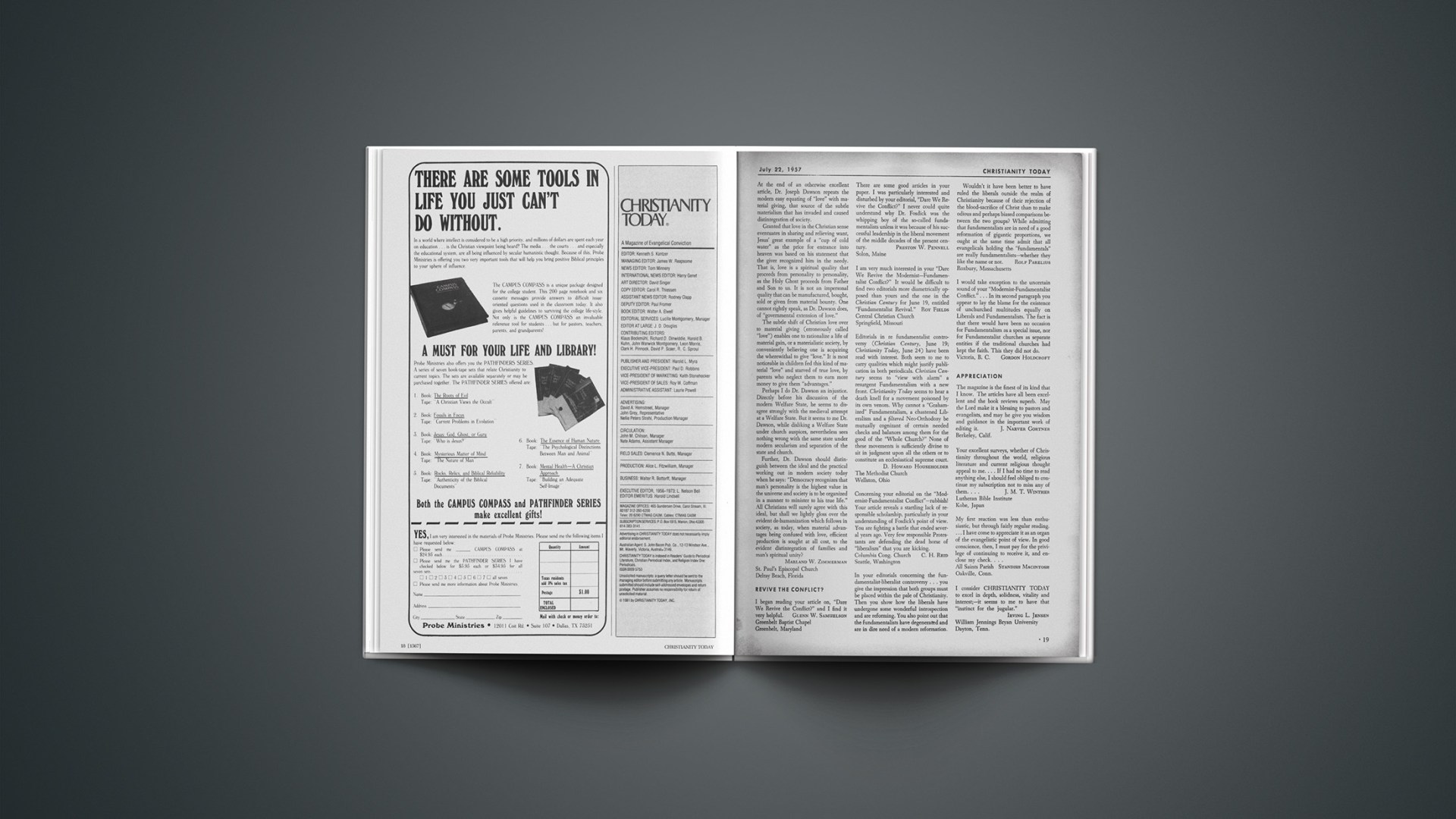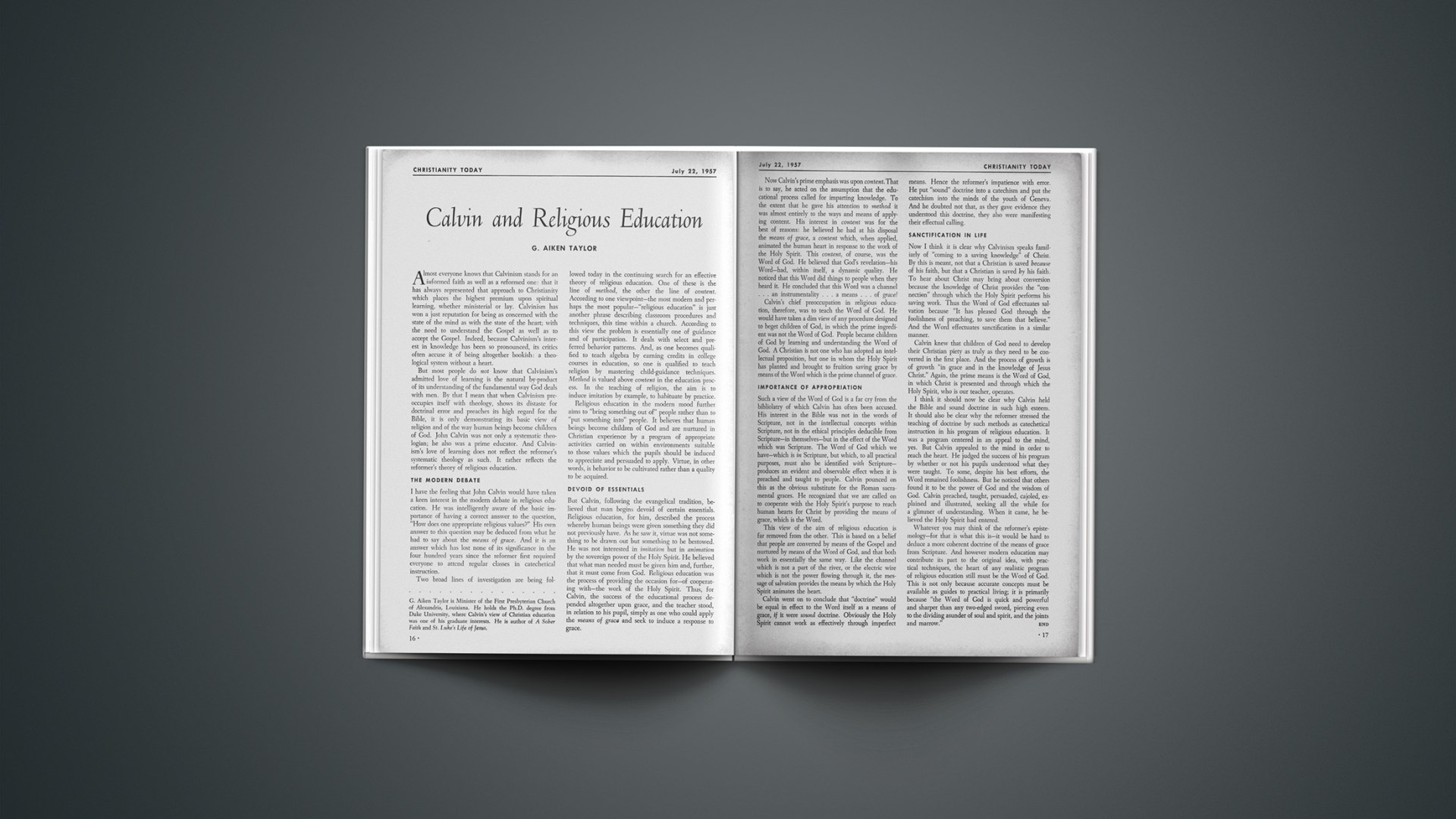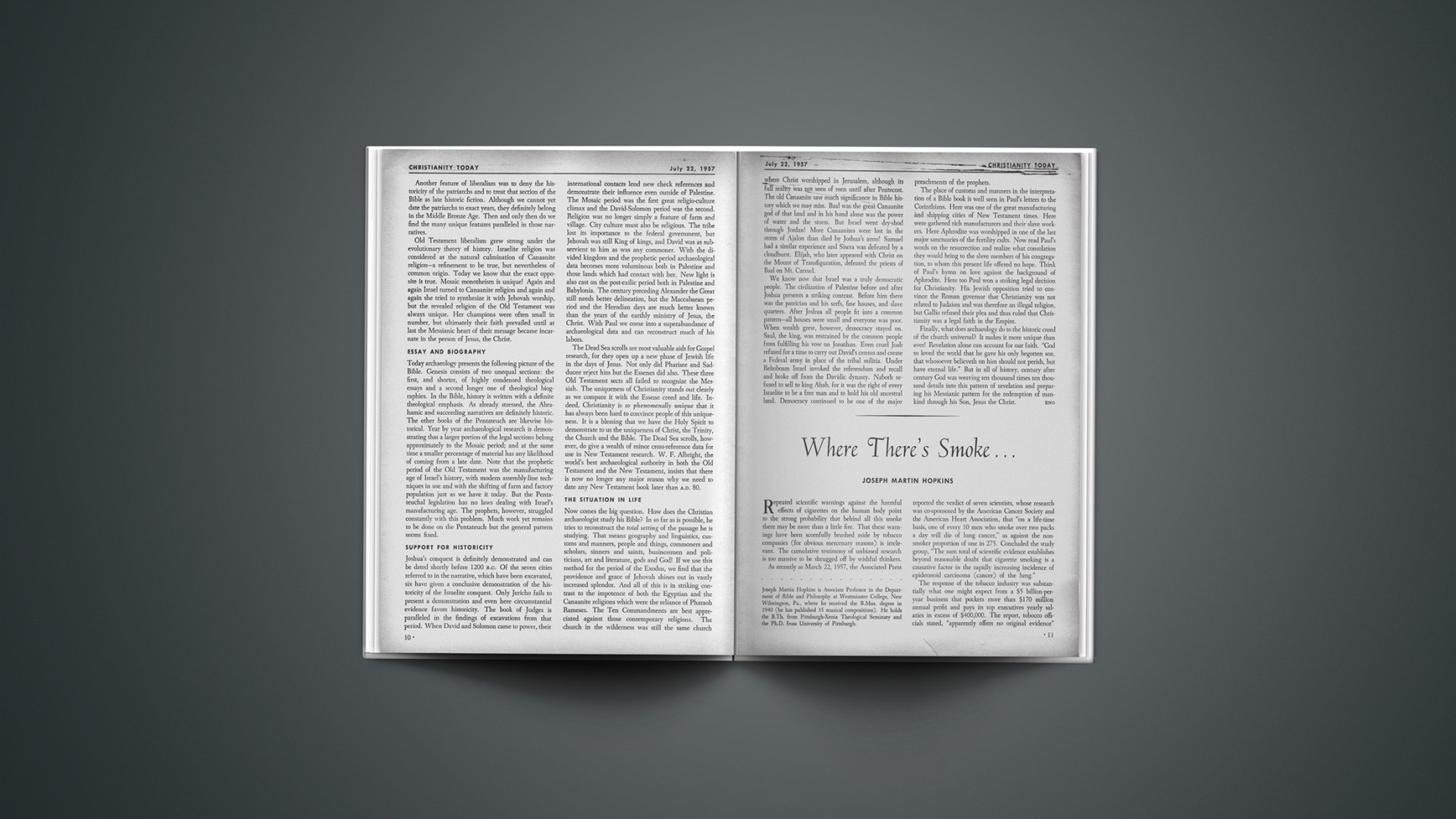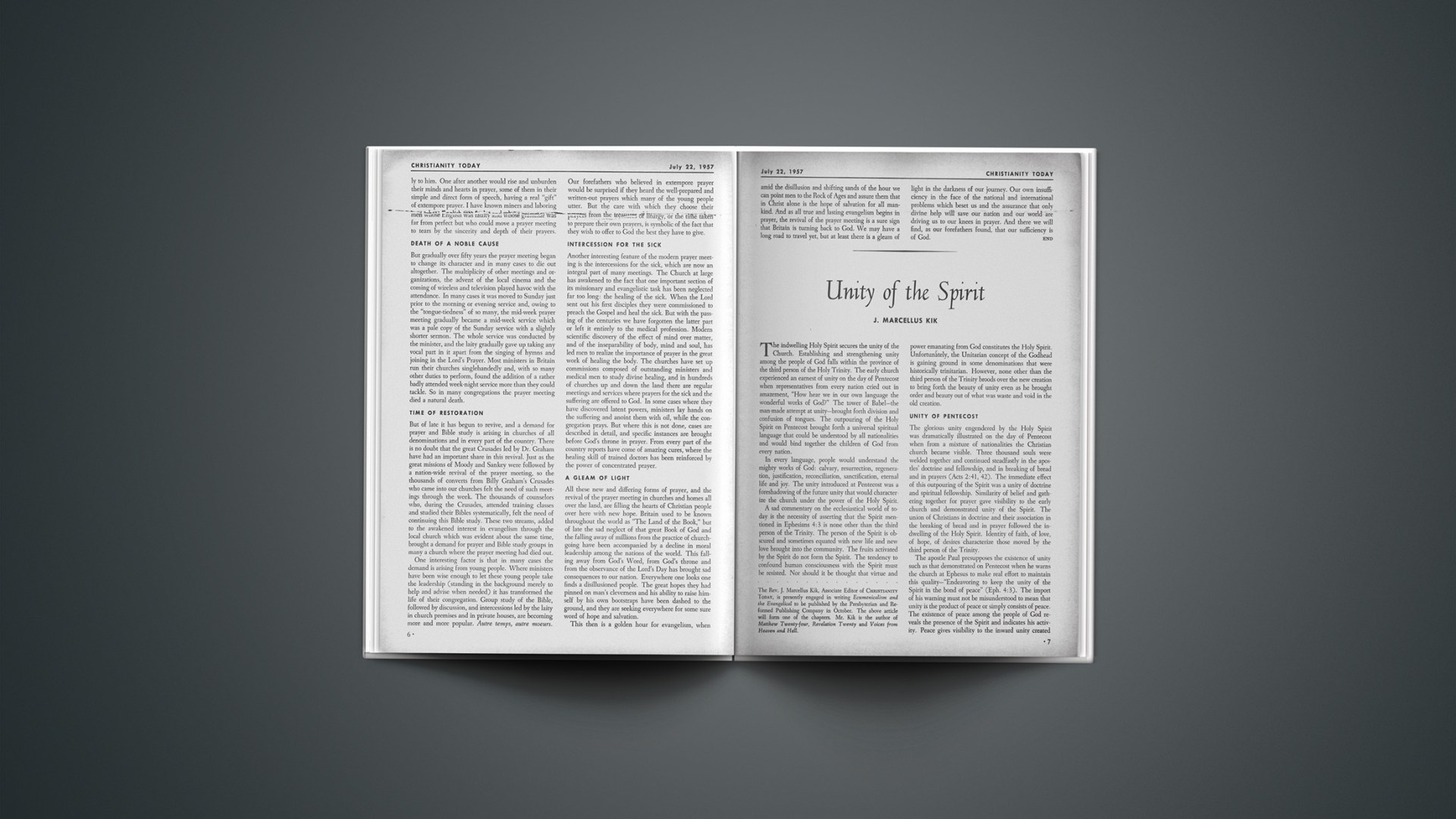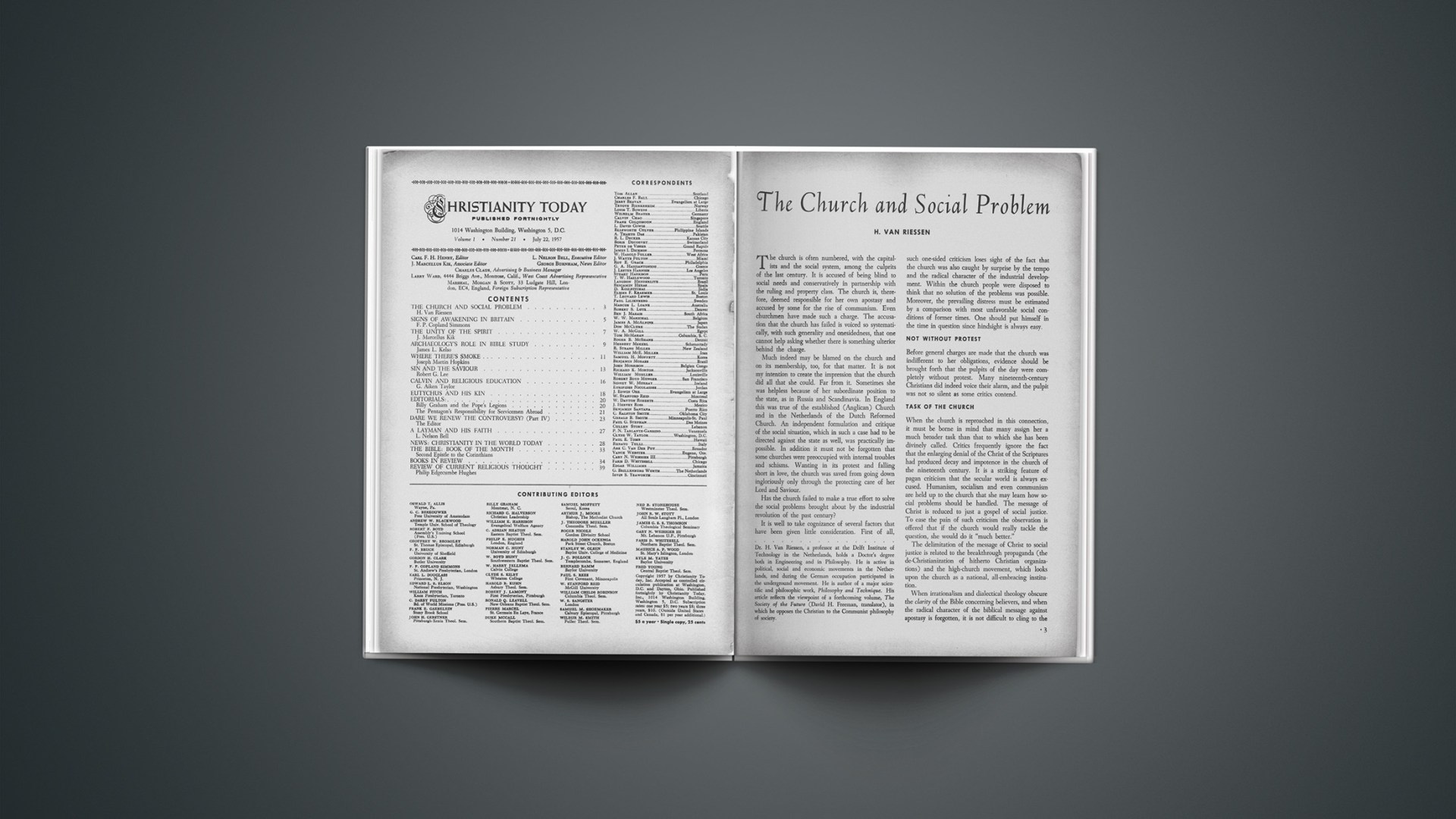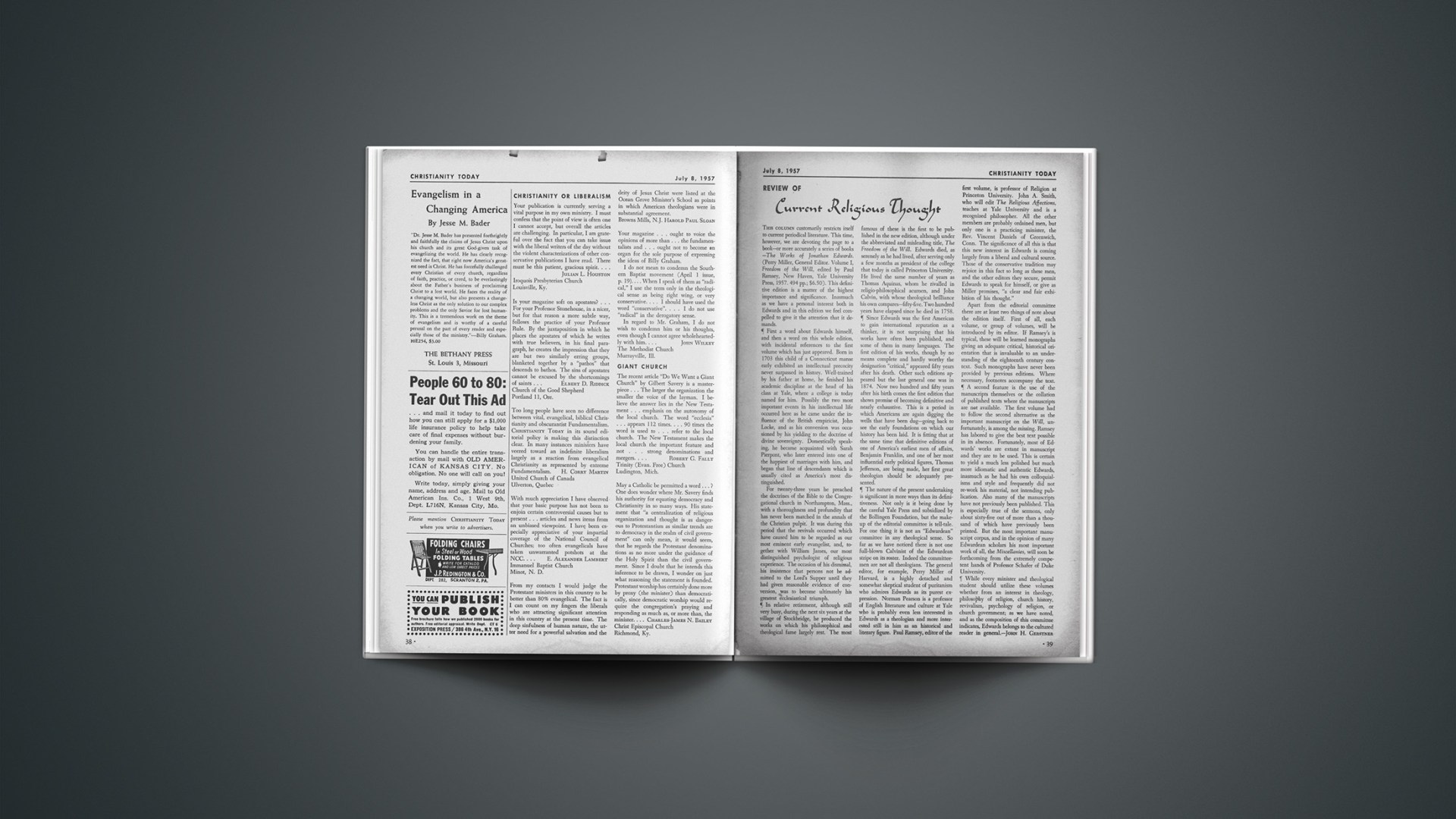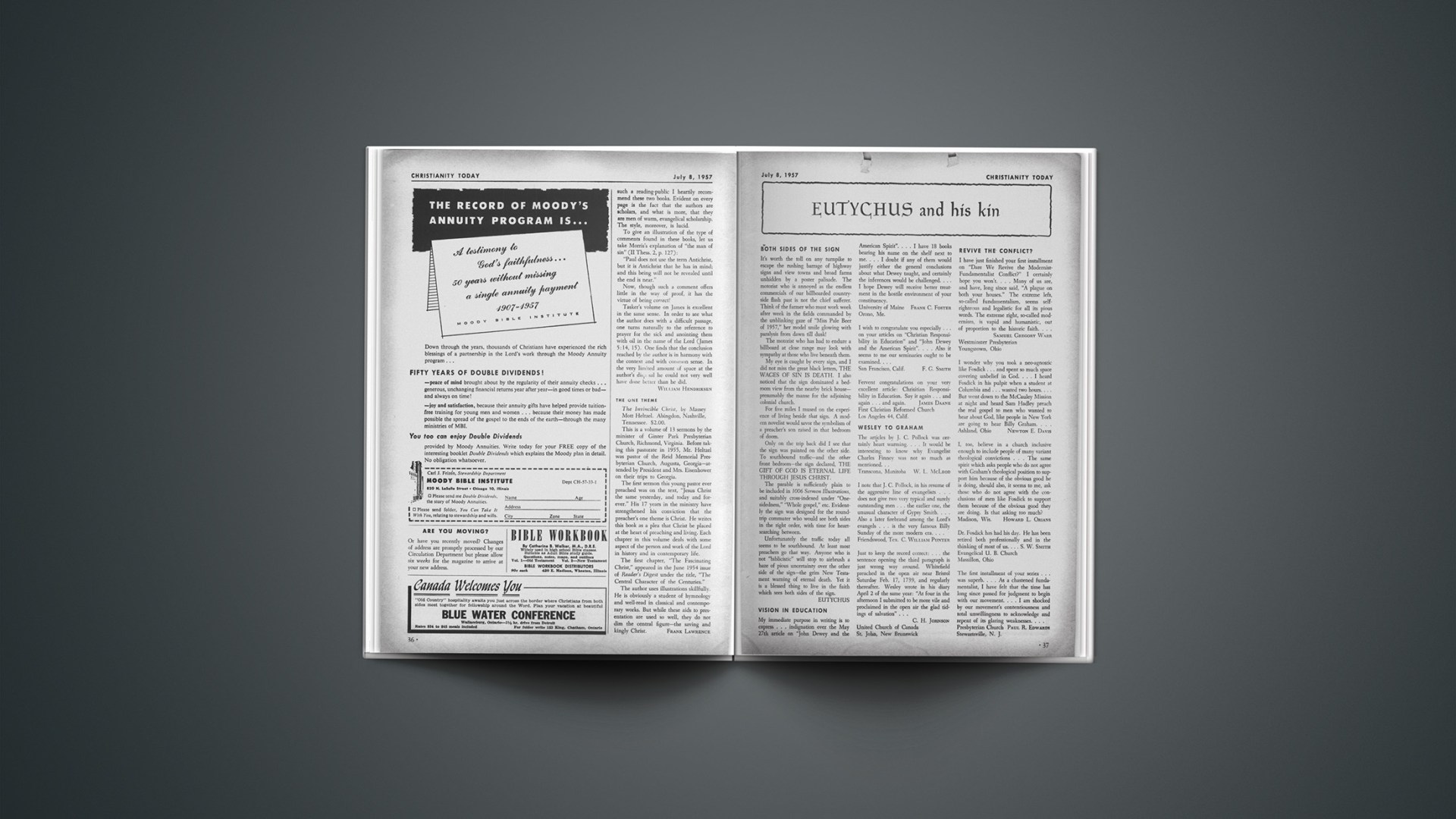TOURISTS AND PILGRIMS
All men are strangers and travelers. Our fathers were pilgrims; we are tourists. The difference is more vast than the breadth of the continent spanned by generations of pioneers. The tourist, to be sure, sees a distinction. It adds relish to his feeling of superiority as he squeals around the curves of some historic trail in the foothills of the Rockies. An unusual and imaginative tourist may even speculate, while picking his teeth in an air-conditioned “chuck-wagon,” as to how his day’s drive compares with the best performance of a Connestoga “schooner.”
Yet the fondness of tourists for playing at being pioneers suggests a difference of another order, one that cannot be measured by the horsepower superiority of the high compression engine. Our curious interest in the voyage of the incredible little replica of the Mayflower is, in part, a tribute to the pilgrim spirit.
The pilgrims traveled with purpose. Between decks in that crowded vessel was a seriousness that our generation can only imitate in the convulsive hysteria of war.
Lack of seriousness is the tourist’s mark. Flipping wisecracks and cigarette butts, he squanders money to pass time. The wonders of an electronic age provide him with gambling devices in the majesty of the desert and comic books on the mountain top. His use of leisure projects in three dimensions the emptiness of his heart.
Every pilgrim seeks a city, a country, a home. The tourist is only leaving his home, or rather losing his home in aimless compulsive wandering. It was not the disappearance of the American frontier that made his travels pointless. Nor will new frontiers on Mars help him. He seeks no frontier for he has lost himself. In his vacuum of faith he needs to hear the call to the heavenly city; to become a pilgrim; to go out—and come home!
EUTYCHUS
THE WELFARE STATE
In CHRISTIANITY TODAY for June 24, 1957, Dr. Joseph M. Dawson writes “… that the state … has the responsibility of extending Christian love to those aspects of public life which affect for good or ill the welfare of one’s neighbors.”
We believe in extending Christian love, but we do not believe it can be done by the state. It can and should be done by individuals. Where the extension of Christian love requires the expenditure of money it can only be done by those who use their own funds. It cannot be done by officials who first have to seize the property of others before they can spend money in an effort to help the needy. Love to the latter cannot be based on taking by force the property of the former.
The state has no function forcibly to seize the property of some of its citizens in order to confer benefits upon other citizens. To do so is violating the Commandments against coveting and stealing.
We believe in relieving suffering and ministering to the needy, but it can be done in Christian love only by individuals in voluntary associations such as the churches and privately-operated charitable organizations. These certainly include hospitals, orphanages, schools, homes for elderly people, and assistance for the unfortunate and the handicapped.
Dr. Dawson declares “… governmental extension of love might cover social security, retirement benefits, assistance to the unemployed, aged and disabled, housing, soil conservation, agricultural subsidies, free education and many other benefits.”
Government can confer such benefits only by seizing the property of others. Since that is stealing, the state has no moral right to do it. Such activities should be carried on by individual Christians in private association through their churches and organizations. Certainly it would not exclude the cooperation of non-Christians in friendly help for needy people.
Dr. Dawson continues: “We conclude with the assertion that the rule of the people means the recognition of human rights—the right of the ignorant to education, the right of slaves to freedom, the right of the employed to fair wages, the right of the child to be well born, the right of all men to justice.”
We believe in the right of all, not merely the slaves, to be free.
The ignorant have a right to such education as they themselves can achieve together with such help as their parents, relatives or friends may be able and willing to extend to them. They do not have a right to education at the unwilling expense of members of the community whose property may be forcibly taken for that purpose.
We believe in the right of the employed to fair wages. The only way to determine “fair wages” is the free market wherein, without government intervention or privilege of any kind, one is paid for his time or his goods, what ever his fellows are willing to bid for them in the open market. That is the only possible way of determining “fair wages” short of government intervention in the realm of wage and price fixing which leads on inevitably to a centrally-managed economy, with great rigidity, lack of capacity for adjustments to changing conditions, subordination of the individual to the authority of the state, and eventually to slavery and totalitarianism.
The child, as a human personality created in the image of God, should be well born, but the state cannot contribute to that end by seizing the property of others. To do so will bring about conditions more unfavorable to children than exists under freedom with the powers of the state strictly limited. The highest degrees of culture and well-being for children, mothers, and the population in general have been developed where the powers of government have been limited, and the most freedom for the development of initiative, self-reliance and independent action have existed. Those states which have tried to do the most in planning elaborate programs of welfare for their citizens have achieved the least welfare for them.
People prosper best under a system which gives them the right to life, liberty, property, the pursuit of happiness, and to achieve all the material, cultural and spiritual well-being of which they are capable. They do not have a right to demand that government give them the property of others. We believe history proves the soundness of this view.
When the state confers benefits upon some at the expense of others, the latter are discouraged and cease to put forth maximum effort, while the former soon learn to believe that real effort on their part is unnecessary. Production inevitably declines, resulting in a lower scale of living for all. This is not only theory and experience; it is history. Why there should be reluctance to accept it and act upon it must indicate, it seems to us, a great lack of fundamental understanding of the issue involved.
HOWARD E. KERSHNER
Editor, Christian Economics
New York City
At the end of an otherwise excellent article, Dr. Joseph Dawson repeats the modern easy equating of “love” with material giving, that source of the subtle materialism that has invaded and caused disintegration of society.
Granted that love in the Christian sense eventuates in sharing and relieving want, Jesus’ great example of a “cup of cold water” as the price for entrance into heaven was based on his statement that the giver recognized him in the needy. That is, love is a spiritual quality that proceeds from personality to personality, as the Holy Ghost proceeds from Father and Son to us. It is not an impersonal quality that can be manufactured, bought, sold or given from material bounty. One cannot rightly speak, as Dr. Dawson does, of “governmental extension of love.”
The subtle shift of Christian love over to material giving (erroneously called “love”) enables one to rationalize a life of material gain, or a materialistic society, by conveniently believing one is acquiring the wherewithal to give ‘love.” It is most noticeable in children fed this kind of material “love” and starved of true love, by parents who neglect them to earn more money to give them “advantages.”
Perhaps I do Dr. Dawson an injustice. Directly before his discussion of the modern Welfare State, he seems to disagree strongly with the medieval attempt at a Welfare State. But it seems to me Dr. Dawson, while disliking a Welfare State under church auspices, nevertheless sees nothing wrong with the same state under modern secularism and separation of the state and church.
Further, Dr. Dawson should distinguish between the ideal and the practical working out in modern society today when he says: “Democracy recognizes that man’s personality is the highest value in the universe and society is to be organized in a manner to minister to his true life.” All Christians will surely agree with this ideal, but shall we lightly gloss over the evident de-humanization which follows in society, as today, when material advantages being confused with love, efficient production is sought at all cost, to the evident distintegration of families and man’s spiritual unity?
MARLAND W. ZIMMERMAN
St. Paul’s Episcopal Church
Delray Beach, Florida
REVIVE THE CONFLICT?
I began reading your article on, “Dare We Revive the Conflict?” and I find it very helpful.
GLENN W. SAMUELSON
Greenbelt Baptist Chapel
Greenbelt, Maryland
There are some good articles in your paper. I was particularly interested and disturbed by your editorial, “Dare We Revive the Conflict?” I never could quite understand why Dr. Fosdick was the whipping boy of the so-called fundamentalists unless it was because of his successful leadership in the liberal movement of the middle decades of the present century.
PRESTON W. PENNELL
Solon, Maine
I am very much interested in your “Dare We Revive the Modernist—Fundamentalist Conflict?” It would be difficult to find two editorials more diametrically opposed than yours and the one in the Christian Century for June 19, entitled “Fundamentalist Revival.”
ROY FIELDS
Central Christian Church
Springfield, Missouri
Editorials in re fundamentalist controversy (Christian Century, June 19; Christianity Today, June 24) have been read with interest. Both seem to me to carry qualities which might justify publication in both periodicals. Christian Century seems to “view with alarm” a resurgent Fundamentalism with a new front. Christianity Today seems to hear a death knell for a movement poisoned by its own venom. Why cannot a “Grahamized” Fundamentalism, a chastened Liberalism and a filtered Neo-Orthodoxy be mutually cognizant of certain needed checks and balances among them for the good of the “Whole Church?” None of these movements is sufficiendy divine to sit in judgment upon all the others or to constitute an ecclesiastical supreme court.
D. HOWARD HOUSEHOLDER
The Methodist Church
Wellston, Ohio
Concerning your editorial on the “Modernist-Fundamentalist Conflict”—rubbish! Your article reveals a startling lack of responsible scholarship, particularly in your understanding of Fosdick’s point of view. You are fighting a battle that ended several years ago. Very few responsible Protestants are defending the dead horse of “liberalism” that you are kicking.
C. H. REID
Columbia Cong. Church
Seattle, Washington
In your editorials concerning the fundamentalist-liberalist controversy … you give the impression that both groups must be placed within the pale of Christianity. Then you show how the liberals have undergone some wonderful introspection and are reforming. You also point out that the fundamentalists have degenerated and are in dire need of a modern reformation.
Wouldn’t it have been better to have ruled the liberals outside the realm of Christianity because of their rejection of the blood-sacrifice of Christ than to make odious and perhaps biased comparisons between the two groups? While admitting that fundamentalists are in need of a good reformation of gigantic proportions, we ought at the same time admit that all evangelicals holding the “fundamentals” are really fundamentalists—whether they like the name or not.
ROLF PARELIUS
Roxbury, Massachusetts
I would take exception to the uncertain sound of your “Modernist-Fundamentalist Conflict.” … In its second paragraph you appear to lay the blame for the existence of unchurched multitudes equally on Liberals and Fundamentalists. The fact is that there would have been no occasion for Fundamentalism as a special issue, nor for Fundamentalist churches as separate entities if the traditional churches had kept the faith. This they did not do.
GORDON HOLDCROFT
Victoria, B. C.
APPRECIATION
The magazine is the finest of its kind that I know. The articles have all been excellent and the book reviews superb. May the Lord make it a blessing to pastors and evangelists, and may he give you wisdom and guidance in the important work of editing it.
J. NARVER GORTNER
Berkeley, Calif.
Your excellent surveys, whether of Christianity throughout the world, religious literature and current religious thought appeal to me.… If I had no time to read anything else, I should feel obliged to continue my subscription not to miss any of them.…
J. M. T. WINTHER
Lutheran Bible Institute
Kobe, Japan
My first reaction was less than enthusiastic, but through fairly regular reading.… I have come to appreciate it as an organ of the evangelistic point of view. In good conscience, then, I must pay for the privilege of continuing to receive it, and enclose my check.…
STANDISH MACINTOSH
All Saints Parish
Oakville, Conn.
I consider CHRISTIANITY TODAY to excel in depth, solidness, vitality and interest;—it seems to me to have that “instinct for the jugular.”
IRVING L. JENSEN
William Jennings Bryan University
Dayton, Tenn.

